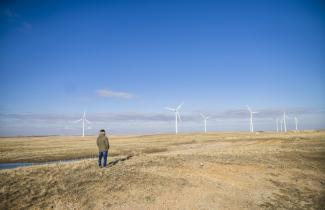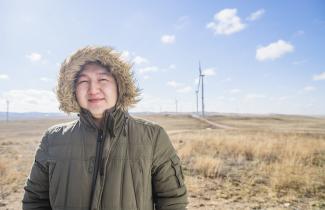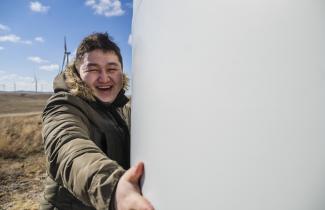Betting Big on Renewals
Kazakhstan’s response to climate change
Story by Hazel Correa, USAID | Photos and Video by Bobby Neptune for USAID
October 2021

Arman Assylkhan, 29, is a renewable energy specialist from Nur-Sultan, Kazakhstan. As a millennial, he believes that climate change is his generation’s crisis. And his chosen career path? That’s the key to addressing it.
By developing power from renewable resources like the sun and wind, Arman says we can transition away from burning fossil fuels, which contributes to global warming.
Air Pollution
Switching to renewable energy doesn’t just slow climate change — it also improves air quality. Globally, nine out of 10 people breathe unhealthy air.
“When I was a kid, we had clean air,” Arman says. “Today, Kazakhstan, like many other countries around the world, is struggling with poor air quality.”



Although Kazakhstan has an abundance of fossil fuels, the government is committed to a green economy. “We are making a statement that there is a better way forward,” adds Arman. “It will set an example for the rest of the region and the world.”Although Kazakhstan has an abundance of fossil fuels, the government is committed to a green economy. “We are making a statement that there is a better way forward,” adds Arman. “It will set an example for the rest of the region and the world.”


With USAID’s assistance, the Government of Kazakhstan achieved its renewable energy target of 3% as a share of total energy production in 2020. It is now working toward its 2030 target of 15% and 2050 target of 50%.
Energy Auctions
In 2018, USAID helped introduce auctions that enable the Government of Kazakhstan to buy renewable energy from companies and investors bidding on contracts.
“Auctions have helped to establish fair prices and lower the electricity costs for utilities and consumers. It has also made the process more transparent and attractive to private investors,” says Arman.



Over a two-year period, USAID helped Kazakhstan leverage billions of dollars from the private sector for 60 new renewable energy projects. These investments are projected to reduce carbon emissions from the power sector by 4% in a few years.



Arman feels the need for his generation to act now: “Renewable energy is the key to the transition to sustainable energy generation and to keeping the planet safe for our children and for future generations.”


About This Story
USAID has partnered with Kazakhstan since the 1990s to encourage private investment in the power sector and generate low-cost energy using a mix of energy resources – particularly wind, solar, hydro, and biomass. For the two decades after the country’s independence, USAID’s energy programs focused on pilot projects to demonstrate the benefits of energy saving and energy efficient systems, and tariff planning to cover costs, maintenance, and upgrades to aging energy infrastructure.
In 2014, the Government of Kazakhstan introduced a feed-in-tariff mechanism program to attract investment in renewable energy sources. In 2018, USAID helped introduce renewable energy auctions. From 2018 to 2020, USAID supported Kazakhstan to leverage nearly $2 billion in private investment, resulting in about 60 new renewable energy projects that will reduce Kazakhstan’s carbon dioxide emissions by 11 million tons—the equivalent of taking 2 million cars off the road for a year.

